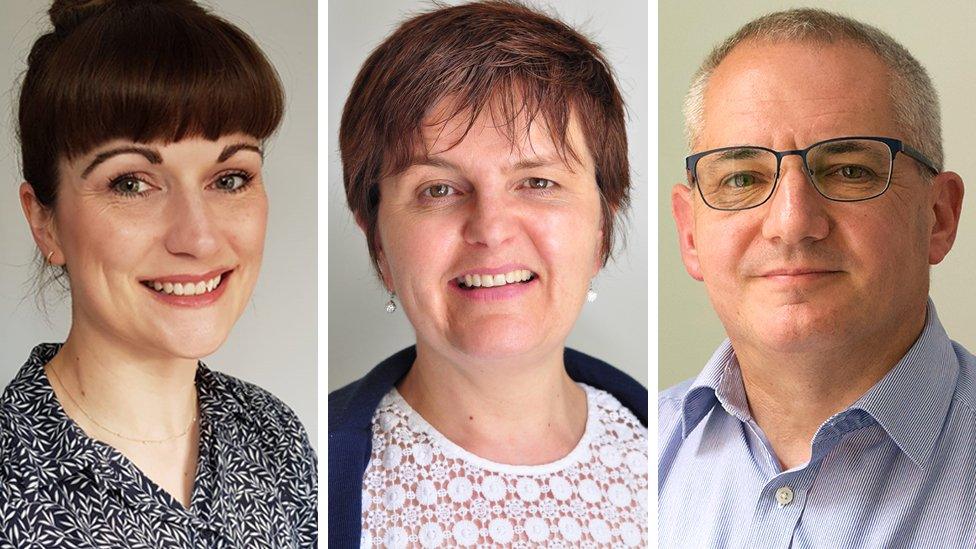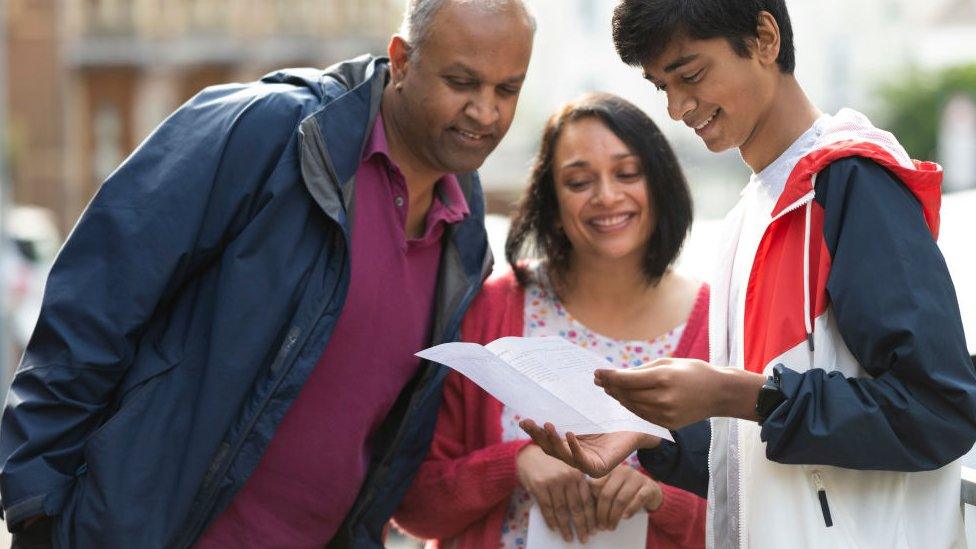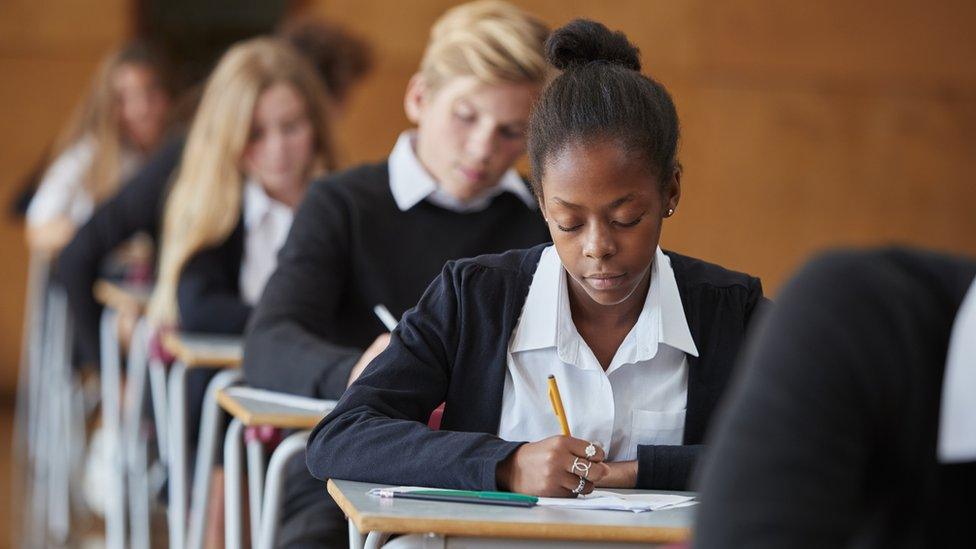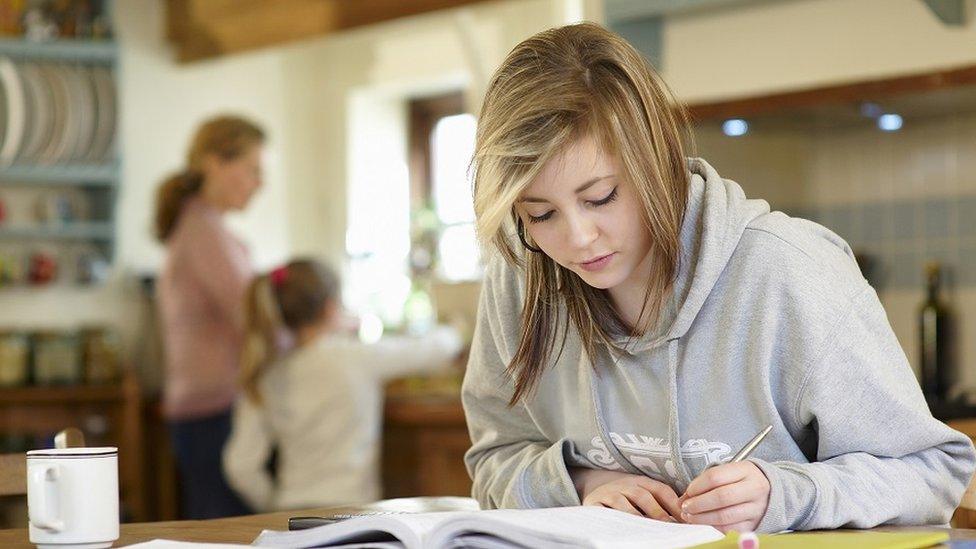GCSE results 2021: Will employers judge Covid grades badly? And other questions
- Published

This is a big day for many young people, as they receive their official GCSE results.
For the second year running, Covid disruption means that formal exams have not been used to determine their grades.
Instead, teachers were asked to mark pupils based on a range of evidence including coursework and assessments.
Experts Eddie Playfair and Catherine Sezen from the Association of Colleges, external, and Joanne Elliott from the National Careers Service, external answer some of your questions about this year's results below.
You can send them a question using the form at the bottom of this page.

Experts Joanne Elliott, Catherine Sezen and Eddie Playfair (l-r) are on hand to answer your questions
How have schools arrived at the grades they give to the students? What evidence do they have to provide if inspected? - Karl Crossland
Catherine Sezen says:
This year's results were awarded as teacher-assessed grades. Schools and colleges had their own polices - supported by national guidance - about the evidence they used to decide individual results.
The grades were internally moderated by schools and colleges before being checked again by the body which awards the qualification.
So this year's grades have been "inspected" to ensure they are accurate.
How do we appeal the results? - Elizabeth Ballinger
Eddie Playfair writes:
If you think your results may be incorrect, you need to speak to your college or school in the first instance.
They will do the initial investigation help you to make your appeal.
There is a helpful student guide to the process here, external.
Schools and colleges must submit appeals to the relevant exam board by 17 September.
How do I convert my son's grades numbers to letters? - Melvyn Whitehouse
Eddie Playfair writes:
GCSE grades in England are now expressed as numbers from 9 to 1, and most of them are not directly equivalent to the former A-G system, so a direct conversion is not possible.
Colleges, universities and employers are now quite used to this system and will know what the grades mean.
My daughter got grade 4 in biology, physics and chemistry, however she was put in for foundation. She also got a grade 3 in maths for foundation. Has she passed? - Melissa Henry
Eddie Playfair writes:
Congratulations to your daughter for her grades.
All grades from 1-9 are pass grades, but there may be specific grade requirements for future courses she wants to do.
For instance, some courses may have achieving a grade 4 or above in maths as an entry requirement.
I suggest she discusses her options with the college or school she is thinking of going to next.
Will employers judge students' grades from 2020/21 as being less valid or meaningful than other years? And if you do suspect that an employer is doing this, what can you do? - Josh Allen
Catherine Sezen says:
Young people and adults receiving GCSE grades today at schools and colleges up and down the country should be proud of their achievements.
Behind the scenes a lot of work has been going to help explain the exceptional circumstances of this year's to those with a keen interest, such as young people themselves, parents/carers and employers.
Remember too that what employers are looking for is a range of skills and attributes, not just grades.
Joanne Elliott says:
Employers will want to see a mixture of hard and soft skills.
Your qualification are hard skills, and soft skills are things like time management, planning, organisation and effective communication.
You can learn, gain and demonstrate these skills through work experience, so it is vital to gain some meaningful work experience if you can.

My son who achieved 8s and 9s in some subjects has got all 6 and 7s. Is there a no-detriment contingency that he cannot get grades below his mocks?
Eddie Playfair writes:
I'm assuming that your son achieved some grade 8s and 9s in internal assessments.
His school or college will have used this evidence, but the final grade they submitted will have been based on a range of different assessments.
This is why the overall result may differ from the mark for a specific individual assessment.
What's going to happen next year? Year 10 pupils have missed much of their normal work. - Emma Thomas
Catherine Sezen says:
Rest assured that the key decision makers are aware of the impact of the past 18 months on young people across the age range at schools, colleges and universities.
Plans for exams in 2022 are being considered at the moment to help ensure that current year 10s will have the best possible opportunity to achieve the grades they deserve, while taking into account the challenges the disruption to learning they have faced.

What questions do you have about this year's results?
In some cases your question will be published, displaying your name, age and location as you provide it, unless you state otherwise. Your contact details will never be published. Please ensure you have read our terms & conditions and privacy policy.
Use this form to ask your question:
If you are reading this page and can't see the form you will need to visit the mobile version of the BBC website to submit your question or send them via email to YourQuestions@bbc.co.uk, external. Please include your name, age and location with any question you send in.
Related topics
- Published22 August 2018

- Published10 August 2021

- Published23 February 2022

